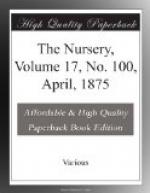Mr. Harrison Weir, whose name is well known to our readers, is another English artist, who makes a specialty of the same department of art in which Landseer became so famous. His sketches are remarkable for their truth to nature, and many of them would do no discredit to Landseer himself.
Lay a piece of thin paper over the drawing-lesson, and trace the lines of the picture. After a little practice, try to copy it without-tracing.
[Illustration: From Sir Edwin Landseer’s painting. In outline by Mr. Harrison Weir, as a drawing lesson.]
A SMART HORSE.
One morning, when the men went to the stable, our horse, Jenny, was missing from her stall. On looking around, they found her in another room, eating meal out of a chest.
Now, in order to do this thing, she must not only have untied her halter, but have unfastened and opened a door, and raised the lid of the chest; all of which were supposed to have been left safely closed.
We thought that she could not have done it all, but that some careless person had left the chest open, and the door unfastened. So Jenny was led back to her stall and tied up; the lid of the chest was shut down, and the door closed and fastened with a hook.
About an hour afterwards, on entering the stable again, Madam Jenny was found as before, with her nose deep in the meal-chest, munching away with great relish. Then we knew she must have unhooked and opened the door, and raised the cover, as well as unhooked her halter.
Do you not think she was pretty smart for a horse? Papa says it was more smart than honest to steal meal in that way. But I suppose horses do not know much about honesty.
I liked Jenny all the better for her smartness, and I have made a great pet of her since. As she is so fond of meal, I take care to give her so much that she will not have to steal it.
She comes to me when I call her; for she knows that I am her friend, and she often gets an apple from my hand. She looks at me so kindly through her great eyes, that I am sure she would thank me if she could speak.
This is a real true story. MARY.
ABOUT SOME INDIANS.
Some boys and girls think Indians are dreadful beings; but my boy, Vaughn, who is now more than three years old, thinks them a very good sort of people. He was born in the Indian country, and is quite used to them and their odd ways.
He often used to stand in the doorway, and say, “How, how?” to them as they passed by; and they would smile, and say, “How, how?” back again. This is the Indian way of saying, “How do you do?”
One day I was at work in the cellar, when I heard strange voices at the front-door: so I went out to sec what was the matter. In front of the house I found quite a number of Indian braves, with their squaws and pappooses, all riding on sorry-looking ponies.




